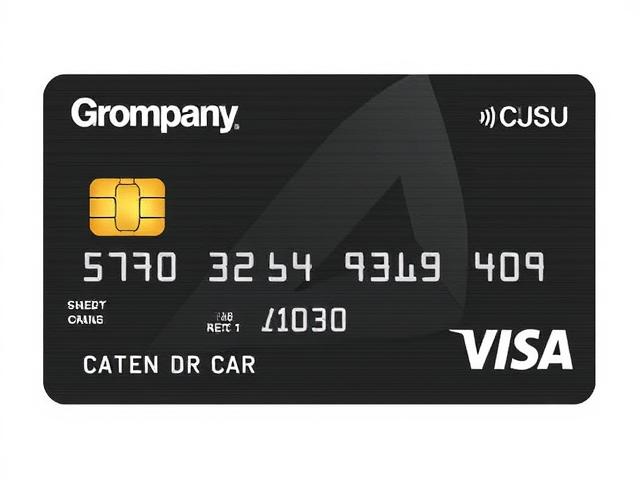Company Credit Card Policy Sample

This guide will provide you with a comprehensive company credit card policy sample, explain why a company credit card policy is needed, detail how to process expenditures effectively, and offer another company credit card policy sample for a different perspective. By understanding and implementing a robust policy, you empower your team while protecting your business.
Company credit cards offer immense convenience and flexibility for businesses of all sizes, enabling swift purchases, streamlined expense tracking, and efficient operations. However, with this convenience comes responsibility – and potential risks. For newer supervisors, managers, or business owners, establishing clear guidelines for company credit card usage isn't just a good idea; it's a critical safeguard for your company's financial health and integrity.
Why Is a
Company Credit Card Policy Needed?

Imagine a scenario where an employee uses their company card for personal shopping, or a manager routinely overspends their budget without proper justification. Without a clear policy, these situations can quickly escalate, leading to significant financial, legal, and operational headaches. A thorough company credit card policy acts as your first line of defense, proactively addressing various possibilities that could harm your company.
Here’s why you absolutely need a detailed policy:
Prevent Misuse and Fraud: Without strict guidelines, company cards are vulnerable to unauthorized personal purchases, cash advances, or even outright fraudulent activities. A policy explicitly defines what is and isn't allowed, minimizing the risk of your company footing the bill for non-business-related expenses.
Ensure Financial Accountability and Transparency: A clear policy mandates proper documentation (receipts), expense categorization, and timely reporting. This promotes accountability among cardholders and provides your finance department with the transparency needed to track spending, reconcile accounts, and identify discrepancies.
Control Spending and Budgets: Policies can set spending limits, require pre-approvals for large purchases, and define the types of expenses permissible for different roles. This helps prevent budget overruns and ensures that company funds are utilized strategically and efficiently.
Simplify Tax Compliance: Proper documentation and categorization of business expenses are crucial for accurate tax reporting. A policy that enforces these practices ensures you can easily justify deductions and avoid potential issues with tax authorities.
Protect Company Assets: Your company credit cards are, in essence, an extension of your company's bank account. A policy safeguards these assets against misuse, ensuring they are used solely for the benefit of the business.
Maintain Fairness and Consistency: A written policy ensures that all employees are treated consistently and understand the expectations for card usage. This eliminates ambiguity and prevents favoritism or perceived unfair practices.
Mitigate Legal and Reputational Risks: In cases of severe misuse, a lack of policy can complicate disciplinary actions, including termination, and potentially expose your company to legal challenges. Furthermore, financial mismanagement can severely damage your company's reputation among employees, clients, and investors.
Streamline Operations: When everyone understands the rules, the process of making purchases, submitting expenses, and approving them becomes smoother and more efficient, saving valuable time for both cardholders and finance staff.
By addressing these potential pitfalls with a robust policy, you protect your company from financial loss, legal complications, and operational inefficiencies, fostering a culture of responsibility and trust.
Company
Credit Card Policy Sample

This sample policy is designed for small to mid-sized businesses, offering a comprehensive framework that you can adapt to your specific needs.
[Your Company Name] Company Credit Card Policy Sample
Effective Date: [Date] Policy Owner: Finance Department
1. Purpose: The purpose of this policy is to establish clear guidelines for the appropriate use, management, and reporting of company credit card expenditures. These cards are provided to facilitate company business, streamline expense processing, and ensure efficient operations. This policy aims to protect company assets, ensure compliance with financial regulations, and maintain accountability for all cardholders.
2. Scope: This policy applies to all employees, contractors, and individuals who are issued or use a Company Credit Card. Adherence to this policy is mandatory.
3. Card Issuance and Eligibility: Company credit cards are issued to employees who frequently incur business-related expenses (e.g., travel expenses, client entertainment, departmental supplies).
Eligibility is determined by management based on job responsibilities and the frequency/necessity of business expenses.
Cards remain the property of [Your Company Name] and must be returned upon termination of employment or when requested by the company.
4. Authorized Use: Company credit cards are to be used solely for legitimate, pre-approved, business-related expenses incurred on behalf of [Your Company Name].
Examples of Authorized Expenses:
Business travel expenses (flights, accommodation, ground transportation, per diem for meals as per company travel policy).
Client entertainment and meals (with clear business purpose and attendees listed).
Approved office supplies, software subscriptions, and necessary equipment.
Conference registrations, professional development courses, and membership fees.
Project-specific materials or services essential for business operations.
All expenses must be reasonable, necessary, and incurred in the best interest of the company.
5. Prohibited Use: The following uses of a company credit card are strictly prohibited and will result in disciplinary action, up to and including termination of employment and legal action:
Personal Use: Any purchase for personal benefit or non-business-related purposes.
Cash Advances: Obtaining cash from an ATM or any other source using the company credit card.
Gift Cards/Store Credit: Purchasing gift cards or store credit for personal use or as unapproved gifts.
Unauthorized Purchases: Expenses not explicitly approved or outside the scope of the cardholder’s job function.
Illegal Activities: Use of the card for any illegal or unethical purposes.
Charges for Non-Employees: Unless explicitly approved for client entertainment or specific business needs, charges for personal guests or family members are prohibited.
6. Spending Limits: Each company credit card will have a pre-assigned spending limit (e.g., per transaction, daily, monthly) based on the cardholder's role and business needs. These limits are strictly enforced and cannot be exceeded without prior written approval from a direct manager and the Finance Department.
7. Receipt Requirements: Detailed, itemized receipts are mandatory for all credit card transactions, regardless of the amount.
Receipts must clearly show: vendor name, date of purchase, itemized list of goods/services, and total amount paid.
For meals and entertainment, the business purpose must be documented, along with the names of all attendees.
Lost or missing receipts must be accompanied by a "Missing Receipt Form" (available from the Finance Department), explaining the circumstances and providing as much detail as possible. Frequent missing receipts will be subject to review and potential card revocation.
8. Expense Reporting and Reconciliation:
Cardholders are responsible for reconciling their card statements and submitting expense reports [e.g., weekly, bi-weekly, monthly by the Xth of each month] using the company's designated expense management system ([e.g., Expensify, Concur, or internal spreadsheet]).
All receipts must be attached to the corresponding expense report.
Each expense must include a clear business purpose/description (e.g., "Client dinner for Project X," "Office supplies for Q3," "Travel to ABC Conference").
Expense reports require approval from the cardholder's direct manager or a designated approver before being submitted to the Finance Department.
9. Managerial Responsibilities: Managers responsible for approving expense reports must:
Review all submitted expenses for compliance with this policy.
Verify the business purpose and legitimacy of each transaction.
Ensure all required receipts are attached and accurately reflect reported expenses.
Approve or reject reports in a timely manner.
10. Consequences of Non-Compliance: Violation of this policy will result in disciplinary action tailored to the severity and frequency of the infraction, which may include:
Verbal and/or written warnings.
Temporary or permanent revocation of the company credit card.
Requirement to personally repay unauthorized expenses.
Suspension or termination of employment.
In cases of fraud or severe misuse, legal action may be pursued.
11. Lost or Stolen Cards: Immediately report a lost or stolen company credit card to [Your Company Name]'s Finance Department AND the credit card issuer directly. Follow up with a written report to the Finance Department as soon as possible.
12. Dispute Resolution: If you identify an incorrect or unauthorized charge, immediately notify the Finance Department and the credit card issuer to dispute the charge within the required timeframe (typically 60 days from the statement date).
13. Policy Review: This policy will be reviewed periodically [e.g., annually] by the Finance Department and Senior Management and updated as necessary.
14. Cardholder Acknowledgment: I have read, understood, and agree to abide by the terms and conditions of [Your Company Name]'s Company Credit Card Policy Sample. I understand that failure to comply with this policy may result in disciplinary action, up to and including termination of employment.
Cardholder Name: _________________________
Cardholder Signature: ______________________
Date: _________________________
How to Process Expenditures

Having a policy is one thing; effectively executing it is another. By establishing a clear process for handling credit card expenditures, you ensure compliance, accuracy, and protection for your company.
Here’s a step-by-step guide on how to process expenditures:
Make the Authorized Purchase:
Before making a purchase, ensure it aligns with the company credit card policy sample and your authorized spending limits.
If a purchase is unusual or exceeds your limit, seek pre-approval from your manager before the transaction.
Obtain Detailed Receipts Immediately:
For every transaction, ask for an itemized receipt. A simple credit card slip showing only the total is often insufficient. You need to see what was purchased.
For digital purchases, save the confirmation email or print a screen shot of the order details.
If a receipt is damaged or lost, immediately fill out a "Missing Receipt Form" with as much detail as possible (date, vendor, amount, business purpose).
Record and Categorize the Expense:
As soon as possible after the purchase, record the expense. This could be by taking a picture of the receipt with your company's expense app (like Expensify), or manually entering it into a spreadsheet.
Always assign the correct expense category (e.g., "Office Supplies," "Client Meals," "Software Subscriptions") and provide a clear, concise business purpose. Example: Instead of "Lunch," write "Client lunch with John Doe from ABC Corp to discuss Project X."
Submit Expense Reports on Time:
Adhere to your company's submission schedule (e.g., weekly, bi-weekly, monthly). Timely submission allows for prompt reconciliation and prevents expenses from piling up.
Ensure all receipts are properly attached or scanned to their corresponding entries in the expense report.
Double-check that total amounts match between receipts and reported entries.
Managerial Review and Approval:
Once submitted, your manager reviews the expense report. Their role is crucial. They should:
Verify the business purpose of each expense.
Confirm the expenses comply with the company policy.
Check for required documentation (receipts).
Ensure spending is within reasonable limits and budget.
Ask questions if anything is unclear or seems non-compliant.
Managers should approve reports promptly to avoid delays in financial processing.
Finance Department Processing and Reconciliation:
The Finance Department conducts a final review for overarching compliance, correct accounting codes, and budget alignment.
They reconcile the approved expense reports with the actual credit card statements from the bank. This step is vital for identifying any discrepancies or unauthorized charges that might have slipped through.
All expense data is then entered into the company's accounting software.
Records (digital and/or physical) of expense reports and receipts are archived for audit purposes.
Ongoing Monitoring and Auditing:
Regularly review credit card statements and expense reports for patterns, anomalies, or frequent policy violations.
Conduct periodic internal audits to ensure the policy is being followed and remains effective. This proactive approach helps identify and address issues before they become major problems.
By following these steps meticulously, you create a robust system that protects your company from financial risk, ensures accountability, and provides accurate financial data.
Another Company Credit Card Policy Sample (Core Tenets)

While the first sample provided a comprehensive, detailed policy, sometimes it helps to see the core tenets distilled into a slightly different format or to ensure all crucial elements are covered. This "another sample" focuses on the absolute essentials that must be present in any effective company credit card policy sample, serving as a checklist or a more concise framework for a smaller business.
[Your Company Name] Essential Company Credit Card Guidelines
1. Authorization & Purpose:
Company credit cards are solely for legitimate, pre-approved business expenses.
They are tools to facilitate business operations, not personal convenience.
2. Permitted Expenses:
Business Travel: Flights, hotels, ground transport, and reasonable meals directly linked to business travel.
Client Engagement: Meals, events, or gifts for clients with a clear business objective.
Operational Needs: Approved office supplies, software, project materials.
All expenses must be necessary and reasonable for business operations.
3. Prohibited Expenses (ZERO TOLERANCE):
Absolutely NO Personal Purchases: This includes personal meals, online shopping, or any non-business related items.
NO Cash Advances: Using the card to withdraw cash is strictly forbidden.
NO Purchases for Others: Unless they are clients for a business purpose, do not buy items for friends, family, or other non-employees.
NO Illegal Activities.
4. Receipts & Documentation:
Every single transaction requires an itemized receipt. No exceptions.
For meals/entertainment, document the business purpose and attendees.
Lost receipts must be immediately reported and a "Missing Receipt Declaration" completed.
5. Spending Limits:
Each card has specific spending limits. You are responsible for knowing and adhering to these.
Exceeding limits without prior, written approval is a policy violation.
6. Expense Reporting:
Generate and submit expense reports by established deadlines ([e.g., by the 5th of each month]).
Attach all required receipts and provide a clear business purpose for each item.
7. Managerial Approval:
Your manager must review and approve all expenses for compliance before they are forwarded to Finance.
8. Consequences of Misuse:
Violations will result in disciplinary action, escalating from warnings to card revocation, repayment of unauthorized expenses, and potential termination of employment. Fraudulent use will lead to immediate termination and legal action.
9. Lost/Stolen Cards:
Report immediately to Finance and the card issuer.
10. Acknowledgement:
By accepting and using a company credit card, you acknowledge and agree to abide by these guidelines.
Cardholder Name: _________________________
Cardholder Signature: ______________________
Date: _________________________
Conclusion